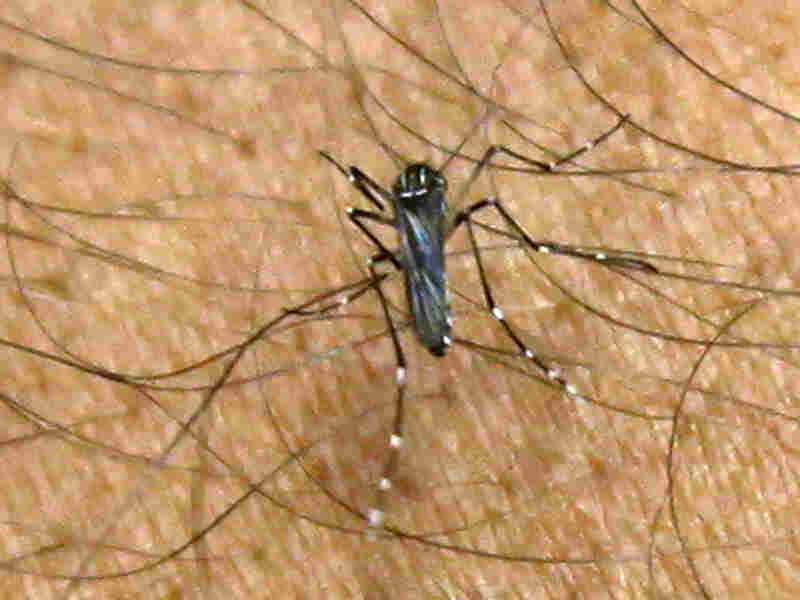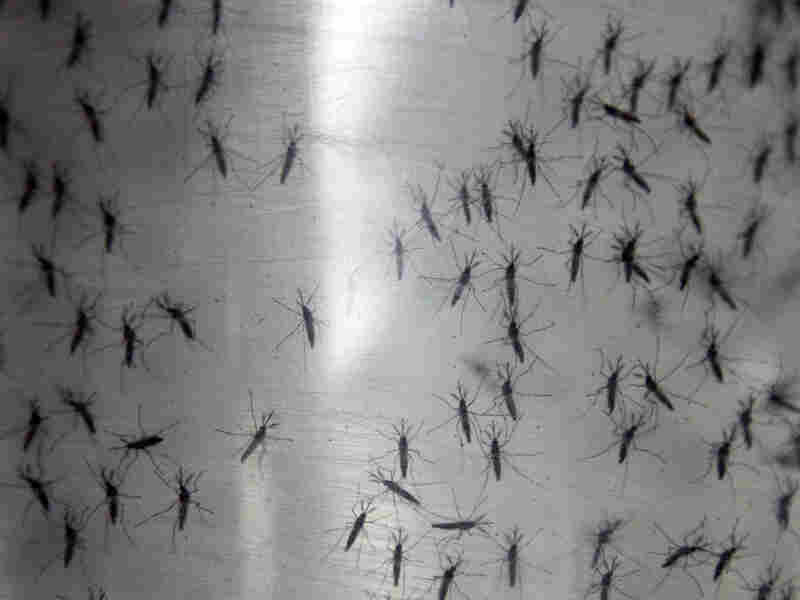Questions About Trump Trailed Obama On His Final Foreign Trip As President
U.S. President Barack Obama answers questions during his news conference at the Asia-Pacific Economic Cooperation (APEC) in Lima, Peru on Sunday. Pablo Martinez Monsivais/AP hide caption
toggle caption
Pablo Martinez Monsivais/AP
President Barack Obama said Sunday he’d avoided ethical scandals throughout his administration by trying to follow the spirit, not just the letter of the law, and suggested President-elect Donald Trump would be wise to follow his example.
Closing out his final foreign trip, Obama was asked about the complex conflict-of-interest questions Trump faces as he transitions from real estate mogul to Oval Office occupant. Though Obama declined to explicitly offer Trump advice, the president said he’d been served well by selling his assets and investing them in Treasury bills.
“It simplified my life,” Obama said. “I did not have to worry about the complexities of whether a decision that I made might even inadvertently benefit me.”
Good government advocates have criticized Trump’s decision not to liquidate his sprawling business interests, but put them in a blind trust entrusted to his children, who are playing major roles in helping him form his administration and are expected to remain involved in one capacity or another.
Obama said he was proud his administration hadn’t faced the scandals he said have “plagued” other administrations. He said after eight years, he felt he could tell Americans he’d lived up to his promise to run an accountable and ethical government.
He summed up the rule of thumb his first White House counsel used to come up with policies for his administration: “If it sounds like it would be fun, then you can’t do it.”
Obama’s remarks came as he concluded his final world tour as president. For Obama, it was the last time he’d take questions on foreign soil, a staple of his overseas trips that his administration has seen as an important symbol of America’s commitment to a rigorous free press.
Obama chatted briefly earlier Sunday with Russian President Vladimir Putin as the summit got under way. The conversation, which was likely to be the leaders’ last face-to-face interaction, lasted just four minutes.
Obama later told reporters he encouraged Putin to uphold his country’s commitments under the Minsk deal aimed at ending the Ukraine conflict. Both the White House and the Kremlin said the leaders had agreed that U.S. Secretary of State John Kerry and Russian Foreign minister Sergei Lavrov should keep working throughout Obama’s final months on initiatives to lower violence in Syria and alleviate suffering.
Putin, speaking later in Lima, said he and Obama had noted that while their working relationship had been difficult, they’d “always respected each other’s positions — and each other.”
“I thanked him for the years of joint work, and said that at any time, if he considers it possible and will have the need and desire, we will be happy to see him in Russia,” Putin said.
The short interaction came amid intense speculation and concern about whether Trump’s election might herald a more conciliatory U.S. approach to Russia. Under Obama, the U.S. has enacted severe sanctions on Russia over its aggressive behavior in Ukraine and has sought unsuccessfully to persuade Moscow to stop intervening in Syria’s civil war to help prop up Syrian President Bashar Assad.
Questions about Trump trailed Obama throughout his final overseas trip, as anxious world leaders quizzed him on Trump’s stances on key issues like trade, foreign policy and the NATO alliance. On his final day in Peru, Obama sought to reassure world leaders gathered here that their longstanding ties with the U.S. wouldn’t falter under Trump.
Sitting down with Prime Minister Malcolm Turnbull of Australia, Obama said he assured Turnbull that the alliance between their countries would remain as strong as ever. Turnbull said he and Obama were of the mind on trade — an issue Trump sees quite differently. Still, he added that Australia wanted the U.S. to succeed under Trump.
Both the U.S. and Australia helped negotiate the Trans-Pacific Partnership, a multinational trade agreement involving 10 other Pacific Rim countries. But Congress is unlikely to ratify the deal, dealing a blow to Obama’s once high hopes of having the agreement become part of his presidential legacy. Trump says trade deals can hurt U.S. workers, and he opposes TPP.
Obama, who met with TPP country leaders the day before, said they’d told him they want to move ahead with the deal.
“Preferably, they’d like to move forward with the United States,” Obama said.
He alluded to a competing deal China is trying to broker that he said would be worse for workers and environmental concerns.
Meeting with Canada’s Prime Minister Justin Trudeau, Obama said he had no doubt the close and important U.S.-Canada relationship will persist after he leaves office, saying that’s been constant with Republican and Democratic administrations alike. Trudeau said he’s invited President-elect Donald Trump to visit Canada soon after Inauguration Day and hopes to welcome him to Canada.
President Barack Obama said Sunday he doesn’t intend to become his successor’s constant critic — but reserved the right to speak out if President-elect Donald Trump or his policies breach certain “values or ideals.”
Offering a rare glimpse into his thoughts on his post-presidency, Obama suggested once he was out of office he would uphold the tradition of ex-presidents stepping aside quietly to allow their successors space to govern. He heaped praise on former President George W. Bush, saying he “could not have been more gracious to me when I came in” and said he wanted to give Trump the same chance to pursue his agenda “without somebody popping off” at every turn.
But Obama suggested there may be limits to his silence.
“As an American citizen who cares deeply about our country, if there are issues that have less to do with the specifics of some legislative proposal or battle or go to core questions about our values and ideals, and if I think that it’s necessary or helpful for me to defend those ideals, I’ll examine it when it comes,” Obama told reporters.
Obama, who has consistently praised Bush for the way he’s handled his ex-presidency, faces a conundrum about how to handle his own. Though he’s vowed to ensure a smooth handover of power, Obama is keenly aware he’s being replaced by a new president whose views on many issues are antithetical to his own.
The president spoke out vigorously throughout the campaign against Trump’s calls for banning Muslim immigrants, deporting millions of people living in the U.S. illegally, reinstituting waterboarding, repealing “Obamacare” and canceling the Paris climate deal, to name a few. Those policy proposals and others like them have stoked fear for many Americans who oppose Trump and are hoping that vehement opposition from Obama and other Democrats might prevent Trump from implementing them.
Yet Obama suggested that while he might not always hold his tongue, his goal wasn’t to spend his time publicly disparaging the next president.
“My intention is to, certainly for the next 2 months, just finish my job,” Obama said. “And then after that, to take Michelle on vacation, get some rest, spend time with my girls, and do some writing, do some thinking.”
Obama’s remarks at a news conference in Lima offered some of his most specific indications to date of how he feels Democrats and Trump opponents should handle the next four years. Asked whether Democrats in the Senate should follow Republicans’ example of refusing to even consider a Supreme Court nominee, Obama said they should not.
“You give them a hearing,” said Obama, whose own Supreme Court nominee, Merrick Garland, has lingered for more than half a year due to the GOP’s insistence that no Obama nominee be considered. Obama said he certainly didn’t want Democrats to adopt that tactic spearheaded this year by Senate Majority Leader Mitch McConnell, R-Ky.
“That’s not why the American people send us to Washington, to play those games,” Obama said.
He declined to weigh in explicitly on whether House Democrats should stick with Rep. Nancy Pelosi as minority leader, arguing it was improper to meddle in the vote. But he said of the California Democrat, who faces a challenge for the leadership post: “I cannot speak highly enough of Nancy Pelosi.”
Obama’s remarks came as he concluded his final world tour as president. For Obama, it was the last time he’d take questions on foreign soil, a staple of his overseas trips that his administration has seen as an important symbol of America’s commitment to a rigorous free press.
Obama said he’d avoided ethical scandals by trying to follow the spirit, not just the letter, of the law, and suggested Trump would be wise to follow his example about conflicts of interest. Though he declined to explicitly offer Trump advice, Obama said he’d been served well by selling his assets and investing them in Treasury bills.
“It simplified my life,” Obama said. “I did not have to worry about the complexities of whether a decision that I made might even inadvertently benefit me.”
Good government advocates have criticized Trump’s decision not to liquidate his sprawling business interests, but put them in a blind trust entrusted to his children, who are playing major roles in helping him form his administration and are expected to remain involved in one capacity or another.
On his final day in Peru, Obama chatted briefly with Russian President Vladimir Putin about Ukraine and the Syria crisis. The four-minute conversation, likely the leaders’ last face-to-face interaction, came amid intense speculation and concern about whether Trump’s election might herald a more conciliatory U.S. approach to Russia
Putin, speaking later in Lima, said he and Obama had noted that while their working relationship had been difficult, they’d “always respected each other’s positions — and each other.”
“I thanked him for the years of joint work, and said that at any time, if he considers it possible and will have the need and desire, we will be happy to see him in Russia,” Putin said later.
Questions about Trump trailed Obama throughout his final overseas trip, as anxious world leaders quizzed him on Trump’s stances on key issues like trade, foreign policy and the NATO alliance. Obama sought to reassure Australian Prime Minister Malcolm Turnbull, Canada’s Prime Minister Justin Trudeau and other leaders gathered in Peru that their longstanding ties with the U.S. wouldn’t falter under Trump.




